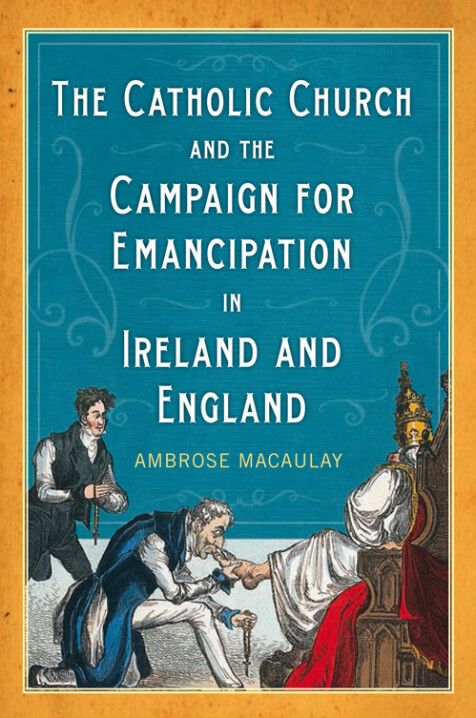The Catholic Church and the Campaign for Emancipation in Ireland and England
Ambrose Macaulay
‘Ambrose Macaulay has set himself the challenging task of retracing the attitude and response of the various tendencies within the Catholic Church over several generations to the insistence of the guardians of the British and Irish state that Catholics could not be admitted to sit in parliament or to high office because it was incompatible with the integrity and security of the ‘Protestant constitution in church and state’ … those seeking a detailed account of the ‘veto’ will learn much from this book', James Kelly, Irish Economic and Social History (2017).
‘Macaulay’s detailed, insider’s account is composed in great part from the original archives in Belfast, Dublin, London, Rome and various other collections and presented in a traditional chronological arrangement, with alternating chapters on the Irish and English arenas. The constant attention to events on both sides of the Irish Sea is one of the great strengths of the book … Macaulay takes the reader through the archival maze with confidence and clarity and a firm grasp of the basic issues … This is the now best book on the ecclesiastical politics of Catholic emancipation. It is careful, modest and consistent. It sets and respects its own limits. It is a first class contribution to the history of English and Irish Catholicism. Our debt to Ambrose Macaulay has deepened further’, Thomas O'Connor, The Furrow (June 2017).
‘Dr Macaulay has long enriched the historiography of 19th century Ireland. A new book from him is most welcome: especially as it provides a further dimension to a much-written period of history … One of the great benefits of Macaulay’s book is that he has studied the English Catholic documents and integrated their story into the overall endeavour to win emancipation. His work is noteworthy, indeed, for its detailed research in the Vatican archives, and British archives as well as a variety of Irish sources … it is clear that this book by Dr Macaulay is necessary reading for anyone interested in one of the most dramatic periods in Irish history’, Peter Costello, The Irish Catholic (November 2016).
‘Ambrose Macaulay’s detailed research reminds us, among much else, that emancipation was close to being included in the Act of Union … It is in the unravelling of the component interest in this great four-cornered debate – the Irish clergy, the English hierarchy, the See of Rome and the Westminster government – that the author’s meticulous scouring of the archive and printed sources is seen to best effect. Monsignor Dr Macaulay’s publications over the last thirty years on the political and social influence of the Catholic church have long established his standing as a widely respected authority, a reputation that will only be enhanced by the availability of yet another impressive Four Courts Press Irish history book’, Trevor Parkhill, Familia (2016).
‘There is much useful detail here abut the terms of the debate over emancipation over a long period, the offers and concessions that were considered, and the reactions and responses in Rome, in Ireland, and in England. It is a rich study deserving attention because it uses the records of the Catholic Church to show a more nuanced view of how the debates evolved, from the controversies over payment of priests, to the veto over the appointment of bishops, to discussions over what oaths would be required after emancipation’, Patrick Geoghegan, Irish Theological Quarterly (2017).
'This is an important work on a significant chapter of Catholic, British and Irish history. Macaulay carefully traces the complexities of the relationship between British and Irish Catholics over the emancipation issue, their respective relationships with the Holy See, and British government demands and intrigues with these parties. The result is a magnificent exposition of the process by which emancipation was granted in 1829 ... a work of such singular accomplishment that it is difficult to see how it will be surpassed for a very long time.', Oliver P. Rafferty SJ, Journal of Ecclesiastical History.

